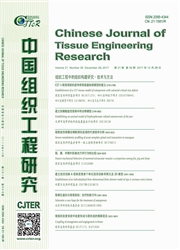

 中文摘要:
中文摘要:
背景:Apelin/APJ系统在心血管调节中具有降低血压、加强心脏收缩及Apelin刺激血管生成等作用已为人们所证实。目的:确认apelin和APJ在内脏组织中的表达,及检验apelin在门脉高压征大鼠的内脏新生血管发育、内脏充血及门静脉侧支化中的关联作用。方法:36只大白鼠随机分为模型组18只和假手术组18只,模型组采用局部门静脉结扎构建门脉高压征大鼠模型,腹腔注射生理盐水或特定Apelin受体拮抗剂F13A。假手术组除不行结扎外,其余同模型组。结果与结论:Apelin及其受体APJ在门静脉高压征的大鼠内脏血管系统过度表达。F13A在门静脉高压征的大鼠中能有效减少内脏血管再生和减少血管内皮生长因子、血小板衍生生长因子和血管生成素2的表达,也能减少门静脉侧支血管的形成。
 英文摘要:
英文摘要:
BACKGROUND:The Apelin/APJ system has been confirmed to decrease blood pressure,strengthen systole and Apelin can stimulate angiogenesis.OBJECTIVE:To determine the expression of apelin and APJ in splanchnic tissues,and to test if apelin has a pathophysiological role in the development of splanchnic neovascularization,splanchnic hyperemia,and portosystemic collateralization in a rat model of portal hypertension.METHODS:Partial portal vein-ligated rats were treated with the APJ antagonist F13A for 7 days.Splanchnic neovascularization and expression of angiogenesis mediators(western blotting) were determined.Portosystemic collateral formation(microspheres) and hemodynamic parameters(flow cytometry) were also assessed.RESULTS AND CONCLUSION:Apelin and its receptor APJ were overexpressed in the splanchnic vasculature of portal hypertensive rats.F13A effectively decreased,by 52%,splanchnic neovascularization and expression of proangiogenic factors vascular endothelial growth factor,platelet derived growth factor,and angiopoietin-2 in portal hypertensive rats.F13A also reduced,by 35%,the formation of portosystemic collateral vessels.These findings suggest that the apelin/APJ system contributes to portosystemic collateralization and splanchnic neovascularization in portal hypertensive rats,presenting a potential novel therapeutic target for portal hypertension.
 同期刊论文项目
同期刊论文项目
 同项目期刊论文
同项目期刊论文
 14-3-3 mediates apelin-13-induced enhancement of adhesion of monocytes to human umbilical vein endot
14-3-3 mediates apelin-13-induced enhancement of adhesion of monocytes to human umbilical vein endot NOX4-Derived Reactive Oxygen Species Drive Apelin-13-Induced Vascular Smooth Muscle Cell Proliferati
NOX4-Derived Reactive Oxygen Species Drive Apelin-13-Induced Vascular Smooth Muscle Cell Proliferati 期刊信息
期刊信息
